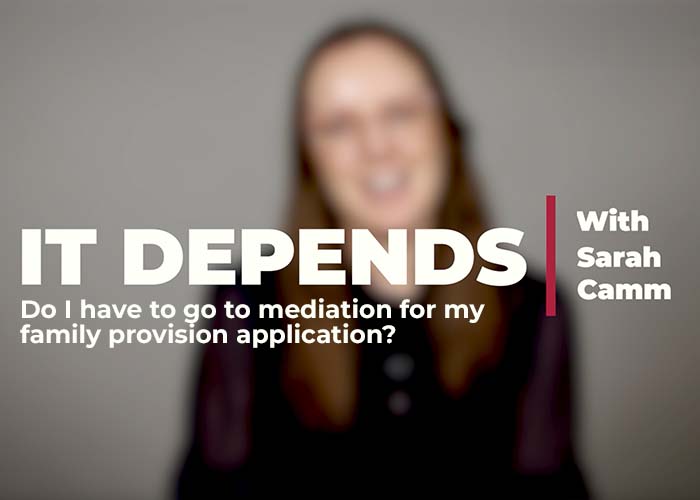In this edition of It depends, associate Sarah Camm talks about whether you have to go to mediation for your family provision application.
Video transcript
Welcome to this edition of It Depends. This time we’re talking about whether I have to go to mediation for my family provision application.
What is a family provision application?
A family provision application or an FPA is a claim made by a person who has been left out of a Will, or for whatever reason, feels as though they should have received more from an estate.
What is mediation?
Mediation is a form of alternative dispute resolution. All of the parties to the dispute and their lawyers get together to try and resolve the dispute by negotiation. The process is facilitated by a mediator, who is usually a solicitor, barrister, or sometimes a former judge who specialises in succession law.
What happens before mediation?
Mediation can happen at any stage of a dispute. It depends on the attitude of the parties. In FPAs, they’ll usually happen after formal litigation has been commenced and the parties have exchanged some documents setting out their positions and filed those documents in court. This means that by the time you get to mediation, you usually have a fairly good idea of what each party’s position is and what evidence they’re going to be relying on, if the claim does go to a hearing.
What happens at a mediation?
The day usually starts with a joint session, with each of the parties sitting around a table making an opening statement. The mediator might summarise the issues as they see them, and then usually the executor will speak about the value of the estate and the terms of the Will, if there is one. Then the lawyers for each of the parties will set out their client’s position. It’s really important at this stage for all the parties to listen to what everyone else is saying. It can be really hard though, because the lawyers are trying to put their client’s best foot forward, which the other parties often will disagree with. It’s not usually going to be helpful to interrupt right there. If possible, just write down the part that you disagree with, pass that note to your lawyer. They’ll either raise it during the joint session or maybe one on one directly later with the mediator.
After the joint session, each party will go to a breakout room with their lawyer, and the mediator will then go around from room to room, speaking with the lawyers and the parties about the strengths and also the weaknesses of their case. This is usually confidential. When the party is ready, they’ll make an offer which the mediator will then take to the other parties, and then they’ll begin that process again with each party.
Do I have to attend mediation?
It depends. Sometimes the dispute is resolved really, really early on by negotiation. So, for example, the lawyer might simply write a letter to the executor making an offer, and the executor will accept that offer. Once a claim is filed in court though, there’s an expectation that parties will attend mediation and the court will usually make directions orders to that effect. There’s a really good reason for this though, most FPAs are resolved by mediation or some sort of negotiation before a hearing. This allows the parties to have some control over the outcome, rather than having a decision imposed by a court. This also means that the dispute will be resolved earlier and with lower legal costs.
Mediation can be a really useful process to resolve a dispute. If you are looking to make an FPA, or if you’re an executor that’s been served with a claim, get in touch with one of our estate dispute lawyers.





